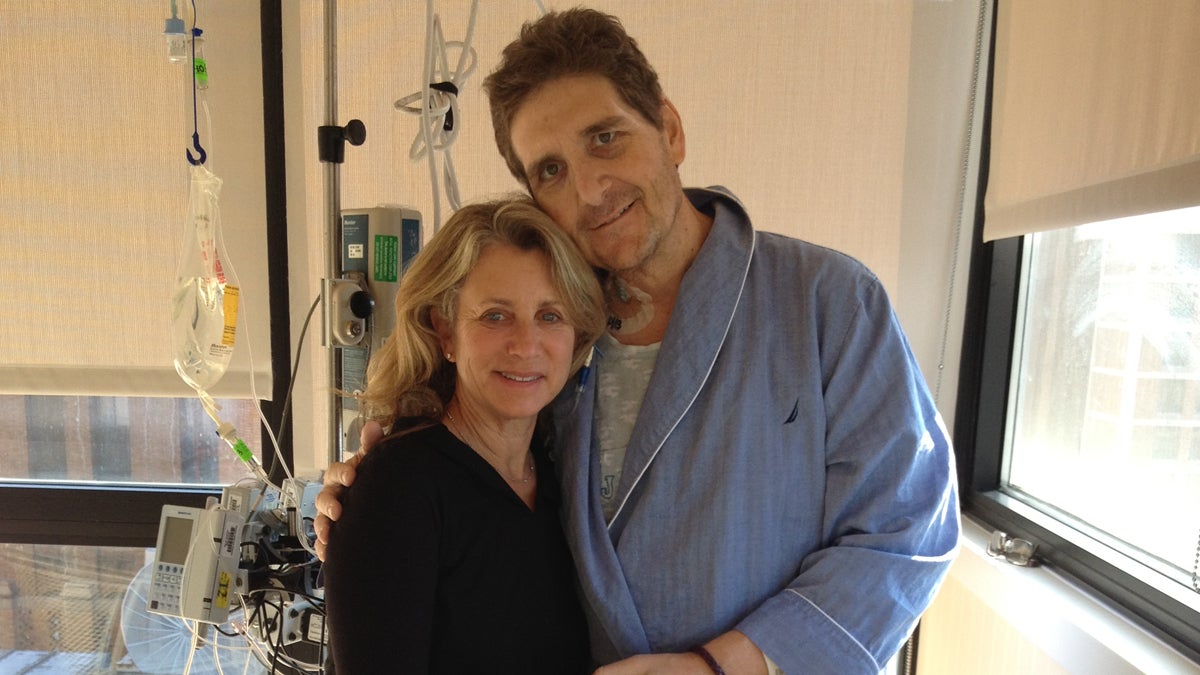From ‘death sentence’ to recovery, pancreatic cancer patient finds new meaning in Thanksgiving
Listen
David Silverstone poses with his wife
Sometimes, it takes a brush with death to remind us what it means to be thankful. That may just be David Silverstone’s opinion, but the soft-spoken 54 year old from Oak Park, California, speaks from experience.
Earlier this year, doctors told Silverstone had had three months to live. A month ago, he proved them wrong. Silverstone was diagnosed with cancer in April of 2013.
“I was experiencing some pain in my abdomen and lower back area,” he said. “I was, in fact, diagnosed with pancreatic cancer. Which, at that time, I truly believed was a death sentence.”
David told his wife, Lisa, and the couple later took his two college-age sons to their favorite beach on the Pacific coast to explain what was happening. Silverstone said it was, at the time, “one of the most difficult things I ever had to do.” But his trials were, unfortunately, just beginning.
David entered a cancer treatment program in California, but 14 months of chemotherapy failed to fully eliminate his tumor. For a time, it seemed like Silverstone’s worst fears were coming true. Several West Coast surgeons told him they could not remove the remaining cancer because it was too close to an artery.
“I had surgeons tell me ‘You have two to three months left to live. You should definitely get your affairs in order.'” said Silverstone.
Two surgeons said a risky surgical procedure called a pancreaticoduodenectomy, or the Kausch-Whipple procedure for short, could potentially save his life. The surgery is extremely invasive, essentially removing and rerouting large parts of David’s gastrointestinal tract — half the stomach, pancreas, a section of small intestine, and other organs would all be cut out — bypassing the artery and removing the cancer for good. But both surgeons had little experience with the procedure, conceived over a half century ago and rarely performed them because of high morbidity rates.
“They said…’The risks far outweigh the benefits for us to perform this procedure and therefore we don’t advise it’,” Silverstone recalls. One surgeon flatly refused to operate, the other was extremely reluctant saying he would only perform the procedure at David’s insistence.
Silvestone began searching the West Coast for experts with little success. But one oncologist did give him a phone number for Dr. Charles Yeo at Jefferson Hospital, a surgical specialist that had, unusually, performed over 1,000 such Kausch-Whipple operations. Yeo looked at David’s files and told him to fly to Philadelphia.
“He told me he would not have me fly out here, after reviewing all my information, imaging and tests and what have you if he didn’t think he could help me,” said Silverstone.
His family was overjoyed. Lisa, his wife, said she knew from the moment she sat down with Yeo, in July, that he would be the person that would save her husband’s life. But David wasn’t so sure. After so many visits to doubtful physicians, he was distraught.
“In my heart of hearts I felt I was truly going through an exercise and that I would end up with the same prognosis as I had with the surgeons on the West Coast,” he said. David’s anxiety continued up to the day he was put under for the surgery, last month.
“The last two people’s faces I saw was my anesthesiologist and Dr. Yeo. I thought to myself, ‘You know what? I’m 54 years old. I’ve had an amazing life, I have two wonderful children.” said Silverstone, tearfully remembering his last conscious moments on the operating table. “‘I’m going to go to sleep now. And God willing I’ll wake up and whatever the outcome, I’ll deal with. And if I don’t, I won’t know the difference.'”
But David did wake up. What had been hours seemed like just minutes, and, still in a haze, his first reaction was that something had gone wrong, and that the doctors had aborted the procedure early.
“I’ll never forget Dr. Yeo rubbing my arm, saying, ‘You’re okay.'” he said. “I just couldn’t process that, with everything I went through, and having all these other surgeons tell me the impossible hurdles to deal with this…I was so thankful that I was awake, and that I was alive.”
In the interceding month, David has recuperated and now has a clean bill of health. He left Jefferson two weeks ago, and the irony that he went from a ‘death sentence’ to being home in time for Thanksgiving dinner is not lost on Silverstone. Already a favorite holiday, he says its taken on a new meaning — a memorial to his recovery and a symbol of all the things he nearly lost.
“Thanksgiving is going to be one of the most meaningful holidays for me, going forward, for the rest of my life.”
WHYY is your source for fact-based, in-depth journalism and information. As a nonprofit organization, we rely on financial support from readers like you. Please give today.



